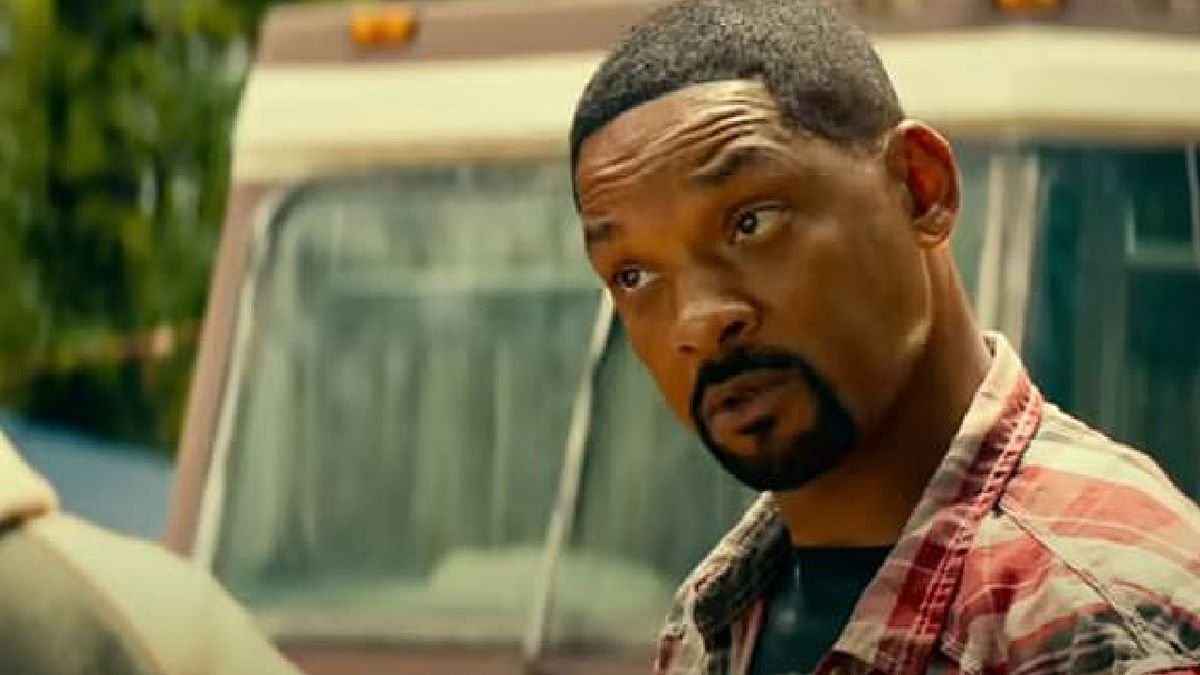Never did I assume, coming out of Michael Bay’s Bad Boys back in 1995, that we’d still be talking about the franchise nearly 30 years later… or that the discussion would encompass so many fascinating and human subjects. What started as a typical buddy cop movie has grown with the characters and the actors, and now addresses larger philosophical topics like family, retirement, parenting, legacy, and more. I finally caught up with Bilal and Adil’s Bad Boys: Ride or Die after seeing how well it did at the box office. What I didn’t expect to see, however, was a vulnerable, raw scene that seemed – in my interpretation – to address Will Smith’s controversial slap at the Academy Awards, and the feelings he wrestled with after the fact.
We all know that Will Smith slapped Chris Rock at the Oscars after the comedian poked fun at Jada Pinkett Smith from the stage. The incident isn’t addressed directly in Bad Boys: Ride or Die, but there’s a facet of the new story that I think is meant to deal with the slap, and its emotional repercussions.
Stop reading now if you do not want to know any spoilers for the current hit, Bad Boys: Ride or Die.

Throughout the fourth Bad Boys movie, the overly confident Mike Lowrey finds himself suffering from panic attacks. Like many who suddenly face anxiety, Mike denies it, and pretends it isn’t happening. But in the middle of various fights, Mike freezes up.
As it turns out, Mike blames himself for his captain (Joe Pantoliano) getting murdered in the previous film, Bad Boys for Life. It’s not helping that Captain Howard’s daughter, Judy (Rhea Seehorn), blames Mike’s son, Armando (Jacob Scipio), for the assassination. Yes, this series has become a soap opera with guns, but still, I commend it for embracing emotional topics facing men as they get older.
As for The Slap, it popped into my mind during the third-act shootout. Mike again freezes up, right when his longtime pattern Marcus Burnett needs him most. This time, Mike sees his former captain in a vision. And Pantoliano essentially tells Will Smith, “It’s OK. It’s not your fault.”
Mike (and also Smith) is being forgiven. He’s being told it’s OK to move on. But it’s what happens next that made me think of Smith’s unfortunate public meltdown. In order to wake him out of his trance, Marcus slaps Mike, and tells him – I’m paraphrasing here – “Stop this shit. You have to move on. Just because you did something back doesn’t make you a bad person.” The dialogue is overdubbed, as it takes place in the middle of a firefight, so you know that the lines were intentionally included. And it’s not that Marcus slaps Mike as he tells him this. It’s the fact that Marcus slaps Mike a second time. And then a third.
It was then that I realized, “Oh, this is Will Smith’s penance.” Mike is being told that something he thinks he did wrong isn’t his fault. Which many movie characters face up to. But it was the three slaps, delivered by Martin Lawrence as he tells Will Smith “you’re not a bad person,” that made me realize the A-lister was trying to come to terms with what he had done. And trying to move past the guilt he likely was feeling.
And doing it in the middle of a $100 million sequel.
When Bilal and Adil took over the Bad Boys franchise from original director Michael Bay, they injected more character development alongside the Bay-hem. We still get explosions and car chases. But the third and fourth Bad Boys movies find our heroes confronting their mortality, wrestling with the growing needs of their families, and their enduring love for each other. As Marcus claims to Mike in Bad Boys: Ride or Die, these men are soul mates. They are bad boys for life.
The new Bad Boys injected life into the box office, and kind of showed that audiences were ready to accept Will Smith as a movie star once again. Did anyone else see that scene in Bad Boys: Ride or Die and see it as a therapeutic release, the act of a celebrity hoping to forgive himself for one bad deed? That’s how I read it, and I was shocked – but pleased – to see it in the movie.

